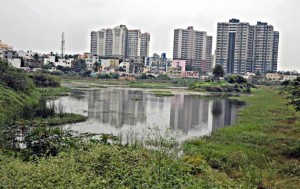Over the last six years, more than Rs. 200 crore from the State’s exchequer was spent on the development of Bangalore’s water bodies that once kept the city cool and verdant. But most funds have gone down the drain, in many cases quite literally as lakes have either turned into pools of sewage or have been encroached.
The quality of water in most lakes is categorised as “E”, which makes it only fit for irrigation, industrial cooling and such other non-potable uses. Their storage capacity too has not increased, reveals documents obtained under the Right to Information Act (RTI Act) for 191 lakes in the city.
Based on a complaint lodged by Wg. Cmdr. (Retd.) G.B. Athri, who procured the documents under the RTI Act, the Upa Lokayakta has convened a meeting on April 12 to discuss the water bodies. He has directed all agencies concerned to submit details on encroachment of water bodies, funds spent on their development work and the failure to control pollution of lakes.
And, acting on the same complaint, Karnataka State Pollution Control Board issued notices to Bangalore Water Supply and Sewerage Board (BWSSB) chairperson, Bruhat Bangalore Mahanagara Palike (BBMP) and BDA commissioners, Deputy Commissioner (Bangalore Urban), and Deputy Conservator of Forest (Bangalore Urban) as they are responsible for the protection and maintenance of most lakes.
While Bangalore Development Authority (BDA) maintains 123 lakes, BBMP maintains 59 lakes. Lake Development Authority (LDA) and Forest Department look after four and five lakes, respectively.
The BDA has spent about Rs.102 crore and BBMP has spent about Rs. 96.5 crore on maintenance of lakes. LDA has spent more than Rs. 5 crore on development of lakes in the past five years.
In the past decade, (a year before the A.T. Ramaswamy-headed Joint Legislative Committee on land encroachments was formed), both Bangalore Development Authority and BBMP acknowledged that the lakes under their jurisdiction have been encroached. “BBMP and BWSSB have been the main culprits in contaminating lakes since raw sewage is let into the water bodies. Past efforts to protect lakes have gone in vain,” said Wg. Cmdr. Athri.
He pointed out that the Karnataka High Court’s order in 1995 says that lake area should not be used for any other purpose, and another order in 2008 prohibited civic agencies from letting of sewage flow into tanks.
He added that despite High Court orders directing officials to protect lakes, encroachments have been allowed.
Commenting on the condition of the lakes in Bangalore, V. Balasubramanian, Chairperson of Task force for Recovery of Lands said that the sudden developments seen in Bangalore over the last 20 years have resulted in the destruction of lakes. Sewage is being let into the lakes and land has been encroached upon.
The task force had identified encroachments on 1,800 acres of 800 lakes in Bangalore.

